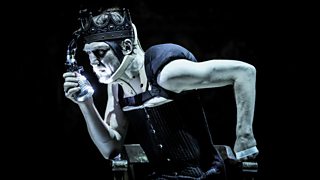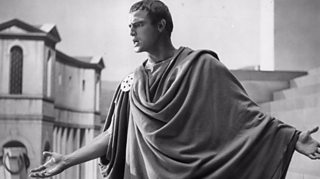Richard III at the Edinburgh International Festival directed by Thomas Ostermeier
In the final part of our series focussing on performances of Shakespeare's works at this year's Edinburgh International Festival we visit Germany.
Influential theatre-maker Thomas Ostermeier's Berlin Schaubühne Theatre production of Richard III is a raw, gritty reimagining of Shakespeare’s unflinching study of evil. Ostermeier remains faithful to Shakespeare’s original, but presents Richard III as both a theatrical thriller and a celebration of evil – of submitting to the inner impulses we usually keep well in check.
Lars Eidinger, a cult figure in German theatre, is a mesmerising, sometimes shocking Richard, damaged and disfigured, who murders his way to the throne and exposes the mistrust and conflict within the ruling elite.
With ferocious live drumming from Thomas Witte and a stark stage design by Jan Pappelbaum, this is an intensely physical, harrowing Richard III that digs deep into the nature of evil and the craving for power.
We caught up with Thomas Ostermeier to find out more:
Edinburgh International Festival
-
![]()
Find out more about Thomas Ostermeier's Berlin Schaub眉hne Theatre production, which runs from 24 - 28 August 2016 at The Lyceum
-
![]()
Declan Donnellan explains Measure for Measure's themes of society, control, shame and corruption and why we should give a wide berth to saints.
-
![]()
A delirious French-language pop-theatre rethink of Twelfth Night from British-born director Dan Jemmett and his theatre Eat a Crocodile.
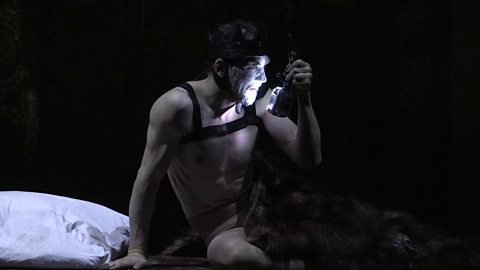
Richard III from Schaubuhne Theatre - Edinburgh International Festival
Influential German director Thomas Ostermeier's production is now on
What is your view of the character of Richard?
The idea of a character who is sent from among the audience in order to embody all our dark desires on stage, and to enact in a play everything we are not permitted to do in our civilized world, is most intriguing. It influenced my initial approach towards Richard, and was one of my main motivations for directing the play: Richard, vicariously, acts out everything we would love to do but must never do. I envisage Richard as a very likable and appealing character.
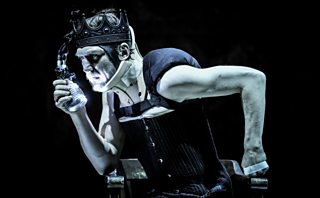
What we see is actually a visit to our very own innermost abyss
I feel that it is very important that the spectators honestly trust and admire Richard, and that they are ready to follow him. I do not think that Richard should ever lose his credit with the audience, so that eventually the full dimension of his crimes and our readiness to fall for him become even more available to our experience.
I am not at all convinced by all these productions that show Richard as a Hitler-parable, or that create a diffuse fascist, totalitarian world. There is no need at all to put Richard III on stage in order to demonstrate the evil of fascism. What is interesting is that his amoral excess triggers our own lust, our own desire, and a production should therefore tease the spectators so much that they, too, wish they were Richard for a day, able to let go of any barrier that our civilized world imposes on our behavior, and able to ignore any feeling of shame and embarrassment.
The true horror of watching Richard III should be the recognition that what we see is actually a visit to our very own innermost abyss.

What can you tell us about the language and translation you chose to use?
A major step in preparing the ground for the production was to commission the translation by Marius von Mayenburg. We met a few times to discuss the dramaturgic emphasis and direction we envisioned for the production, and we debated some cuts. It was this abridged version which he then translated. As in our previous work, Marius’ translation aims at making Shakespeare intelligible.
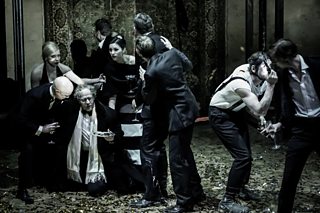
It is impossible to literally translate rhymed blank verse
It is impossible to literally translate rhymed blank verse: you have the same number of syllables, between ten and eleven, to express the same sense, yet German words have a much higher syllable count than English words. For this purely mathematical reason, you have to condense or reduce the sense and meaning of every single line. If you additionally aim, like the famous Schlegel-Tieck translations of German Romanticism, to preserve the rhyme pattern, you will inevitably end up inventing some most bizarre linguistic constructions just to make the rhyme fit. This makes any translation of Shakespeare into German, which tries to retain the form and be true to the verse, outright incomprehensible. There are then two alternatives: either you serve the form and invent your own poetry; you will get Shakespeare-inspired poetry, at least. Or you let go of the verse and the rhyme altogether and instead try to capture the meaning. Marius’ talent is to go the latter way, while still creating a very rhythmic language. He primarily concentrates on the sense and uses free, variable rhythm, and quite often he does in fact arrive at a close approximation of blank verse and its iambic pattern.
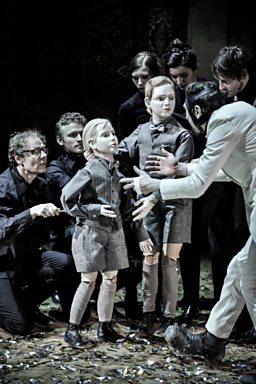
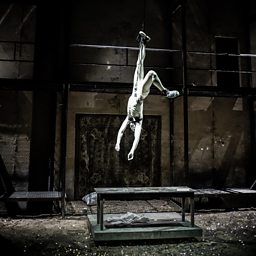
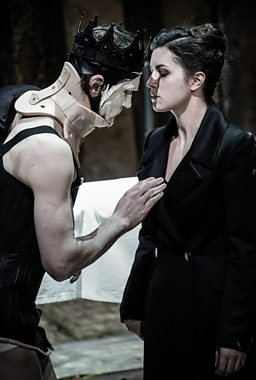
More from Shakespeare Lives
-
![]()
Rio is hotting up for the start of the 2016 Olympics so as the nations come together for this occasion Shakespeare Lives wanted to look at how other countries have interpreted Shakespeare at the movies.
-
![]()
To commemorate the 400th anniversary of the Bard's death, Shakespeare's Globe has assembled an all-star cast to make 37 short films - one for each play - and here's the twist: each lavish 10 minute vignette is made on location in the real setting of each plot.
-
![]()
Whether in songs or dances, serenades or marches, Shakespeare鈥檚 plays suggest music at every turn.
